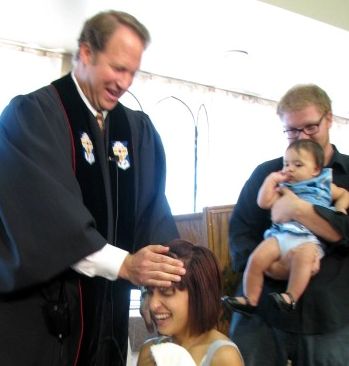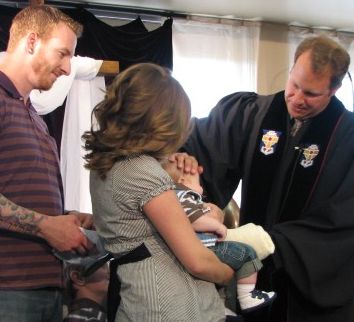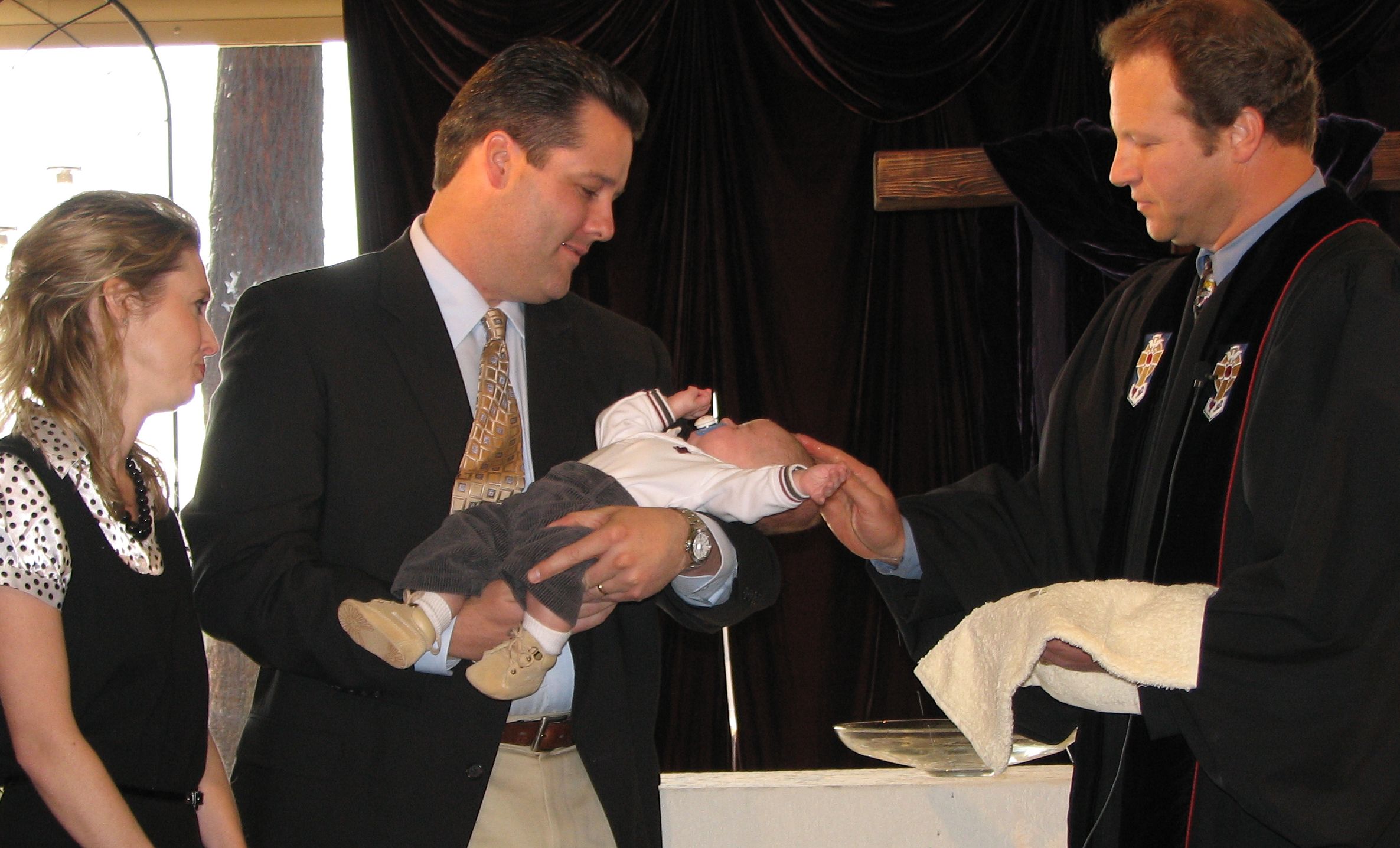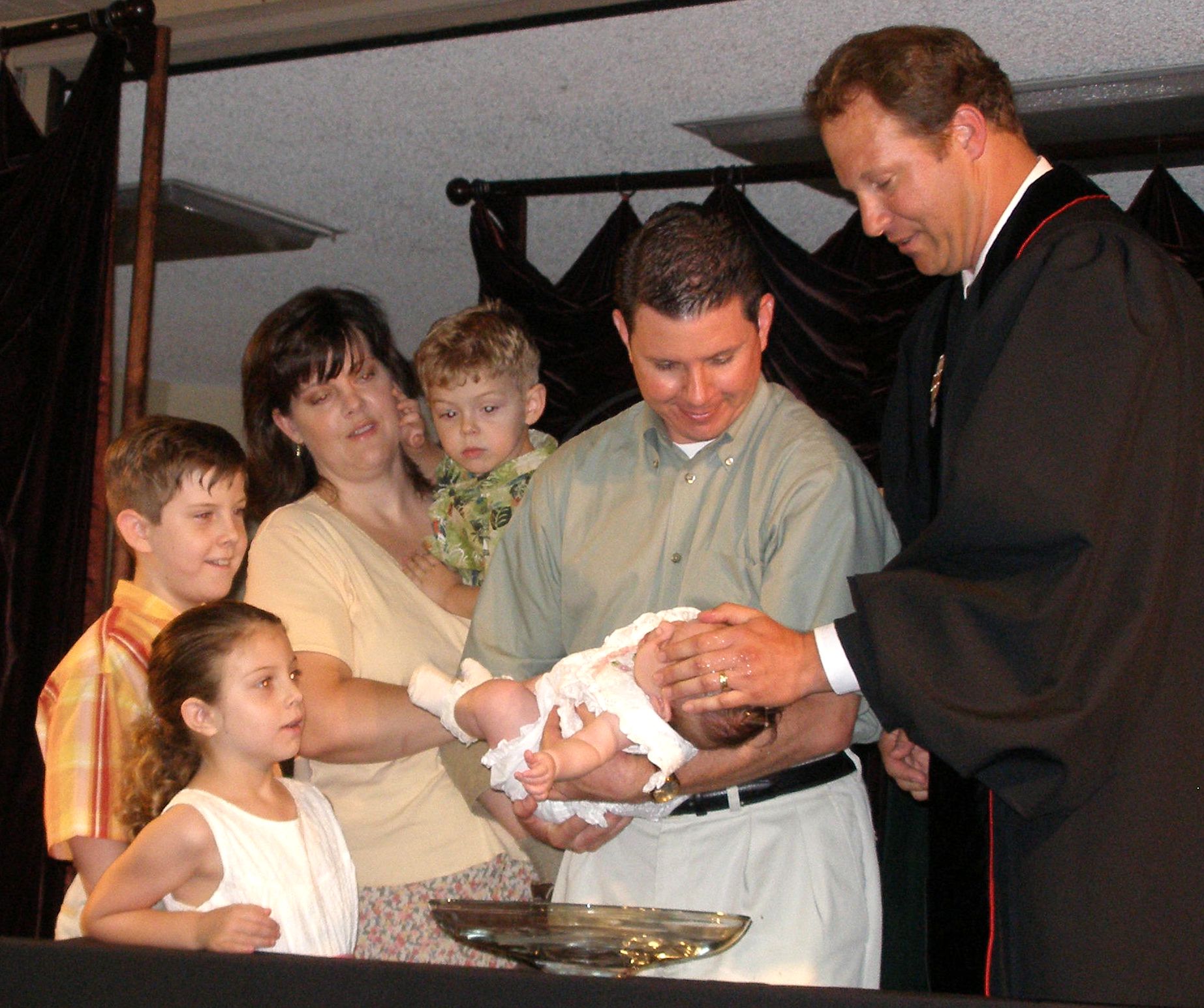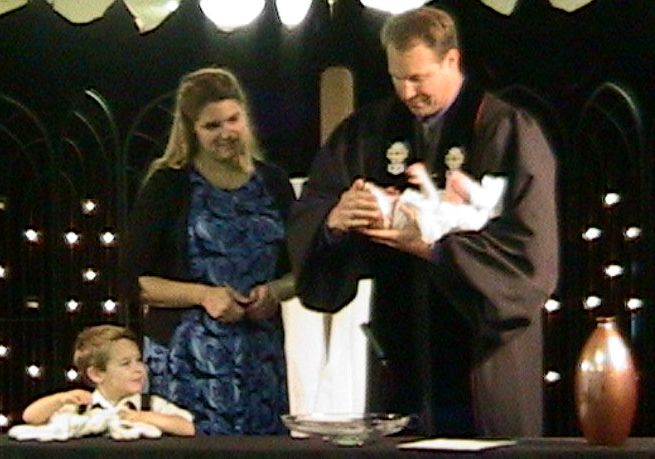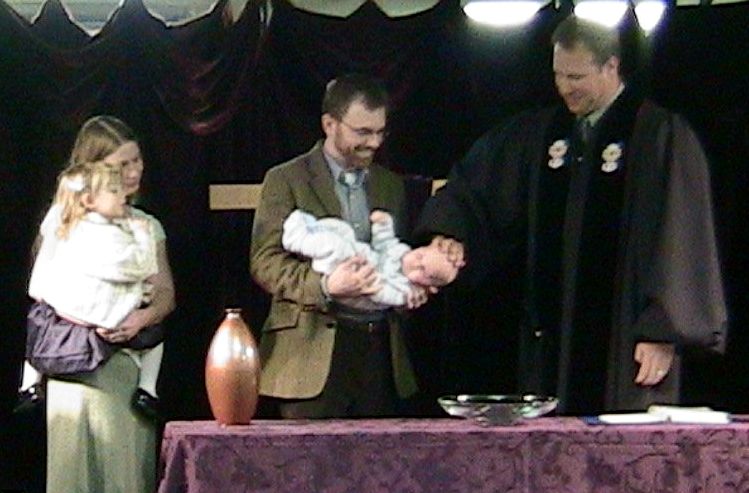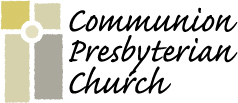 |
Worship
Service | Newsletter | GIFT
groups | Leadership | ARP | Membership | History | Mission | Readings | Links | Family | Contact
|
Baptism |
||
Matthew 28:19,20 Go therefore and make disciples of all nations, baptizing them in the name of the Father and of the Son and of the Holy Spirit, - teaching them to observe all that I have commanded you. And behold, I am with you always, to the end of the age. If I have baptized my children in their infancy, have I properly applied this passage? I consider my children to be “disciples” of Christ. They are “learners.” They have received a Trinitarian baptism which includes them in the body of the church with other disciples. They are being taught the commands of Jesus – they have been "set apart" as children of God (and also set apart from this crooked generation... (Acts 2:38-47)). Who would object to this? A Roman Catholic wouldn't, nor would the Lutheran, the Methodist, the Orthodox, the Episcopalian… Just those "baptists" (a little tongue and cheek here!) A Baptist will say, “Wait a minute. You didn't quote all the New Testament verses about expressing faith first. How do we know that your children are really saved or not?” A reply: “How do we know if anyone is REALLY saved?” Jesus said, “A tree is known by its fruit.” As Christians we usually look for the “fruit” of a proper profession and a demonstration of a proper morality. Consider the fruit of my own young children. They will tell you that they love Jesus. They demonstrate remorse when they disobey, and they long to be with all their family at church. Both my children at their young age are very moral – big nasty sins or foul language never do they produce -- in fact, they do a better job of maintaining moral standards than I do (they are the first to point out my behavioral inconsistencies! Thank God for children)! I’m serious about going in
this direction for the following reason. As a former youth pastor
with
decades of youth ministry experience,
I have heard and seen a ton of “testimonies” and “accepting
of Jesus,” in
my day – but also with a high rate of backsliding
and falling away. I’ve
been to enough “camp type” meetings and witnessed hundreds
of people do things “the Baptist way” (…say a prayer,
accept Jesus, get baptized, and be really excited, for a while…)
but they did not continue to walk with Jesus. EFFECT So the BIG question then is this: What does Baptism actually do? Well, for the Baptist, it means that the baptized is really serious now about following Jesus and they want everyone to know about it. For the Roman Catholic, it literally means receiving the justifying grace of regeneration (salvation!). For everyone in between (except Quakers because they don’t baptize…) it “means” a variety of theological expressions. But what they all have in common is this: baptism singles out the baptized as a visible follower of Christ, a member of His Body, the Church = a disciple. I’ve taken us on a short trip to arrive at this question: At what age can you become a Christian disciple? Well to borrow from King David, “Yet You are He who took me from the womb; You made me trust You at my mother's breasts.” Psalm 22:9. To borrow from Moses, … 'Gather the people to Me, that I may let them hear My words, so that they may learn to fear Me all the days that they live on the earth, and that they may teach their children so.' Deuteronomy 4:10. And of course Jesus, … "Let the little children come to me and do not hinder them, for to such belongs the kingdom of heaven." Matthew 19:14. My case for baptizing anyone is directly related to marking out the baptized as a disciple – and it is founded upon the Great Commission. The Great Commission was actually in force in the Old Testament – but the emphasis was upon Jewish families and the evangelization of their children, "There was not a word of all that Moses commanded that Joshua did not read before all the assembly of Israel, and the women, and the little ones, and the sojourners who lived among them." Joshua 8:35 “...gather the people. Consecrate the congregation; assemble the elders; gather the children, even nursing infants…” Joel 2:16. Today's commission is now broader than Israel. The message is for the entire world; but like the Old Testament, still to our immediate family, “And Peter said to them, ‘Repent and be baptized every one of you in the name of Jesus Christ for the forgiveness of your sins, and you will receive the gift of the Holy Spirit. For the promise is for you and for your children and for all who are far off, everyone whom the Lord our God calls to Himself.’" Acts 2:38, 39. Some would say, "Jesus chose
adults to be disciples, not children." But we also know that
Jesus' "choice" was
rather compelling, "You
did not choose Me, but I chose you, and appointed you, that you should
go and bear fruit, and that your fruit should
remain, ..." John 15:16. The
baptism of our children is a reflection of this verse -- God makes
the decision as to who follows Him. Jesus
just said that his followers DID NOT choose him -- but HE chose them.
Baptism is the observance that asserts that God makes the choice
before an individual decides to follow. "In
that same hour he rejoiced in the Holy Spirit and said, "I
thank You, Father, Lord of heaven and earth, that You have hidden
these things
from
the wise and understanding and revealed them to little children;
yes, Father, for such was Your gracious will." Luke
10:21 “There is one body and one Spirit- just as you were called to the one hope that belongs to your call- one Lord, one faith, one baptism, one God and Father of all, who is over all and through all and in all. But grace was given to each one of us according to the measure of Christ's gift.” Ephesians 4. There are a few things on which to comment here: First, the “one baptism” referred to here is not a “mode” of baptism, but the reality of what baptism represents – the washing and regenerative work of the indwelling Holy Spirit who raises the Christian up in Christ to become a child of God. Baptism is a gracious, but physical demonstration of “Christ’s gift” to his “Body,” the Church. This baptism is a "sign & seal" of Christ’s benefits applied to those in the church, no matter their age. Secondly, there is ONE BODY to which people are CALLED, and ONE FAITH of ALL, and GRACE is GIVEN TO EACH. The simple, obvious question arises from this passage -- are children considered to be a part of this BODY? Can they be CALLED as infants? Do children also receive GRACE? In baptizing our children, (and agreeing with how Old Testament Israel identified their family) we communicate the affirmative to all these questions! Baptism has as its end for a disciple, “...that we may no longer be children, tossed to and fro by the waves and carried about by every wind of doctrine, by human cunning, by craftiness in deceitful schemes. Rather, speaking the truth in love, we are to grow up in every way into him who is the head, into Christ, from whom the whole body, joined and held together by every joint with which it is equipped, when each part is working properly, makes the body grow so that it builds itself up in love.” Ephesians 4. You will note the corporate nature of the church here; everyone is a part of the body, in place to build each other up toward Christian maturity. Baptism is the beginning of identifying with the Body, and being a disciple, where everyone's growing faith contributes to the health of the entire Body – no longer as children (metaphorically and in reality) but as maturing and faithful followers of Jesus. This is the reason why we baptize who we baptize. To set people apart as Christ's disciples, and to welcome them into the body for the purposes of spiritual growth. Those who are baptized, at any age, are declared a child of God, and a brother and sister in the family of God. BUT WAIT, THERE'S MORE To be fair, this was an introductory lesson that did not treat all the nuances of the Greek language (which we have studied), or defend the convictions of Covenant Theology (which we embrace), or examine the history of “sacramental" debates among the denominations (which is great fun!), or include any references to Reformed/Presbyterian Confessions (Which are still the standard for all Protestant churches). This post was intended to arrive at a bottom line discussion for where agreement can be found on this admittedly divisive topic. We invite your comments, questions, and perspectives! Peace to you, and the Church of Christ! ---)------------ Here is an article by Michael Horton titled: "Re-thinking Baptism." Please scroll down to the bullet points located at: "Why Baptize Infants?" Elder Response (Topic: Baptism) As we have heard today, our Reformed understanding of Baptism rests on a number of key concepts: 1. There is in Scripture a fundamental unity and continuity between the Old and New Testaments: There is only one plan of salvation throughout the Bible. Salvation is and has always been by grace through faith in God. 2. Baptism doesn’t save us or our children any more than circumcision saved the Israelites. 3. As the song says, “Father Abraham had many sons…I am one of them, and so are you.” The Apostle Paul tells us that all who have faith in Christ are sons of Abraham (Gal. 3:7) and heirs according to the Promise (3:29). And God tells us from the start that this Promise, or Covenant, is everlasting (Gen 17:7). 4. Baptism is not a sign of something I did (my decision to follow Christ). It serves not as my witness to others, but as God’s witness to me. Since all men are helpless to save themselves and since salvation is the work of God alone, baptism beautifully portrays this spiritual truth: The water is applied to me, not by me; I am passive in the receiving of baptism, just as I am in the receiving the saving grace of God. 5. Baptism serves as a “stamp” or “seal” of Divine authenticity which God uses to assure us of His Promise of salvation to all those who believe in Him. The Apostle Peter reminds us that the same Promise God made to Abraham is “for you and your children, and for all who are far off, as many as the Lord our God shall call to Himself” (Act. 2:39). 6. Scripture repeatedly teaches that God works redemptively not just in individuals, but through households. Children of believers are special in God’s eyes. They receive numerous blessings and advantages that those outside the household do not enjoy. [The Great Commission is fulfilled first in the home—when godly parents exercise their great privilege and responsibility to raise up their children in the Lord.] Children of believers are set apart from the children of unbelievers and therefore receive the mark of God’s promise to His people in Baptism. 7. Finally, Baptism sets us apart to a holy life lived for God.
God’s gracious Promise of salvation is for those who embrace
the Promise through faith and repentance. But if we do not live lives
of faith befitting our baptism, we will receive God’s wrath
and judgment. If you have been baptized but are not living a life
of faith and love for God, and serving Him out of thankfulness for
His mercy, see to it that you turn now and receive God’s abundant
mercy and love. -- Elder Watts |
|
| ©2009 Communion Presbyterian Church. All Rights Reserved. |

